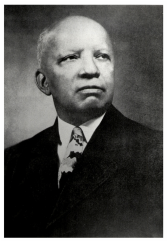| February is Black History Month which is celebrated throughout many countries aside from North America. The United States have been celebrating it since 1926 due to the efforts of Dr. Carter Godwin Woodson. former slaves, Dr. Woodson (1875 - 1950) was a noted black scholar and historian; he was disappointed that no schools taught the history of Black America which he felt was a vital cornerstone in the formation of American society. As a result, on February 19, 1926, Woodson designated the second week of February as Negro History Week. |
In Canada, the Black Railroad Porters brought the celebration of Black History to Toronto in the 1950’s. The Canadian Negro Women’s Association then broadened the celebration to the Black community. In 1979, the Ontario Black History Society (OBHS) successfully initiated the formal celebration of February as Black History Month with the City of Toronto. However, it was only in 1996 that February was declared Black History Month across Canada.
But why is a month needed to celebrate Black History? The need to celebrate Black History is to educate the public of the history of Black people and the contributions they have made in Canada. Although Blacks have been in this country since the 1600’s, there was not a lot of information on this subject. Early historical books have no mention of Blacks in Canada nor do they mention their contribution throughout Canadian history.
There were many well-established and thriving Black communities throughout Canada but they have long since disappeared. There were few or no monuments or museums to acknowledge them. One reason why history was not recorded is that people did not record their stories, being too busy struggling to survive. Furthermore, stories were not passed on to their children due to the shame associated with the past.
In his article, entitled “Why We Need Black History Month - All Year Around”, Henry Martey Codjoe, Policy Consultant with the Alberta Department of Education, wrote the following:
“ … I find it a tragedy that many Black and African children grow up today convinced of their own inferiority. The educational process largely ignores the contributions of Blacks to world civilization and is full of negative perceptions of Blacks and their culture. The school system in North America has continually perpetuated the historical myths and stereotypes about the African past….”
As a Black educated in Canada, I too was not aware of Black history or of Black people’s contribution to this country. It was not until 1995, after becoming a member of both the Ontario Black History Society and the Black Cultural Society of Nova Scotia, that I became educated on this subject. Aside from learning briefly about slaves in the United States from school, I have since learned that Canada too had slavery and of the great achievements that Blacks have made in this great nation.
Henry Codjoe’s article continues with the following:
Why is it important to know our history? Carter Woodson, …was the premier Black historian to put forward the idea of African history as a form of Black cultural empowerment and emancipation. In his view, the knowledge and dissemination of African history would, ‘besides building self-esteem among blacks, help eliminate prejudice among whites.’…
In a speech at Hampton Institute in 1921, Woodson addressed the issue head on: ‘We have a wonderful history behind us. ... If you are unable to demonstrate to the world that you have this record, the world will say to you, 'You are not worthy to enjoy the blessings of democracy or anything else'. They will say to you, ‘Who are you, anyway?’…
The purpose of Black History Month then, is to recapture the many missing pages of Black peoples’ struggles, triumphs, and contributions to Canadian society. Similar to Carter Woodson, I too feel that educating the public about Black History is twofold. One, it enlightens the public about this subject. Second, it helps to dispel any misconceptions and stereotypes that Black people in the past, whether in the United States or in Canada, were associated only with slavery or as domestic servants.
Source:
"Ghana Review" Vol. 1. No. 6, Friday 27 January 1995, Supplement Black History Month, "A Commentary on Black History Month in North America." From the African Heritage Month Web-site http://www.dal.ca/~acswww/dalbh.html, Why We Need Black History Month-A Canadian Perspective with permission of Randy Barkhouse.

 RSS Feed
RSS Feed
